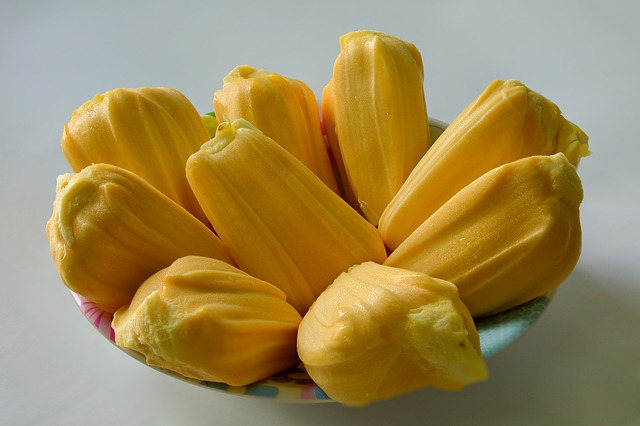Jackfruit is native to the rain forests of South India, and it is grown across the tropical regions of the world. Known as the largest tree fruit in the world (one fruit can weigh up to 100 pounds), it’s part of the Moraceae family, it is related to fig, breadfruit, and mulberry. It has yellow or green spiky skin, which peels off to reveal yellow flesh that is very sweet and edible whether ripe or unripe.
Jackfruit is a sweet, unique tropical fruit that has become popular with vegan and vegetarian enthusiasts in recent years because of its many health benefits. Jackfruit is notorious for its intense smell when it’s ripe and ready to eat, but there’s more to it than its infamous odor. It is highly nutritious and can even serve as a substitute for meat in certain dishes.
Jackfruit: A Very Nutritious Fruit
A cup of jackfruit (165 g) contains 155 calories, 92% of which are carbohydrates. It contains many vitamins and minerals that can help maintain overall health, including fiber, protein, Vitamin A, Vitamin C, magnesium, potassium, manganese, copper, and riboflavin. Because it thrives in tropical climates, it can be a significant source of nutrition for people in developing countries.
What sets jackfruit apart from tropical fruit is its protein content. One cup of jackfruit contains 3 grams of protein, compared to less than 1 gram in apples and mangoes. (For reference, the daily protein requirement for a healthy person is around 50 grams per day, and there are 13 grams of protein in one boiled egg.)
Jackfruit Helps Manage Your Blood Sugar
Jackfruit is rich in fiber and protein, which slows your digestion and prevents blood sugar spikes. Better blood sugar control means fewer cravings for processed sugar and fewer spikes in your overall appetite. Jackfruit’s flavonoid antioxidants also contribute to balanced blood sugar levels.
Jackfruit Protects You Against Disease
Antioxidants protect cells from inflammation and damage caused by free radicals. Jackfruit contains many powerful antioxidants, including:
Vitamin C – Aside from providing daily nutrition, jackfruit contains high amounts of vitamin C that prevents inflammation, heart disease, and even cancer.
Flavanones and carotenoids – These help lower blood sugar, cholesterol, and blood pressure, which then reduce the risk of type 2 diabetes and heart disease. Carotenoids can also prevent eye problems such as cataracts and macular degeneration.
Jackfruit Can be Used in Many Dishes
Vegans and vegetarians have turned to jackfruit as a meat alternative. The texture of the fruit is similar to shredded meat, so you can cook the flesh in spices, seasonings, and vegetables and place it in a taco or sandwich. You can also incorporate it into soups or curry.
Ripe jackfruit functions similarly to other sweet fruit in that you can add it to yogurt or oatmeal for flavor or use it as a topping for just about any sweet dish. Even unripe jackfruit has a good flavor that can be used in many different ways.
Jackfruit seeds are also very healthy. You can roast or boil them with seasoning to make hummus.
Conclusion
Jackfruit is very rich in nutrients, especially fiber and protein. It also contains many antioxidants that can regulate your blood sugar and prevent chronic heart disease. No matter what type of cuisine you prefer, there are many ways to incorporate jackfruit into your diet. If you’ve never tried jackfruit as a meat substitute, seek out a vegan restaurant near you!
If you are looking for healthy places to eat in downtown Phoenix, Sexy Chef is the best choice for you. We offer South Pacific comfort food with vegetarian options, including a slow-cooked baby brined jackfruit infused with South Pacific flavors and BBQ sauce served on a Kona bun. Order online or visit us today!

